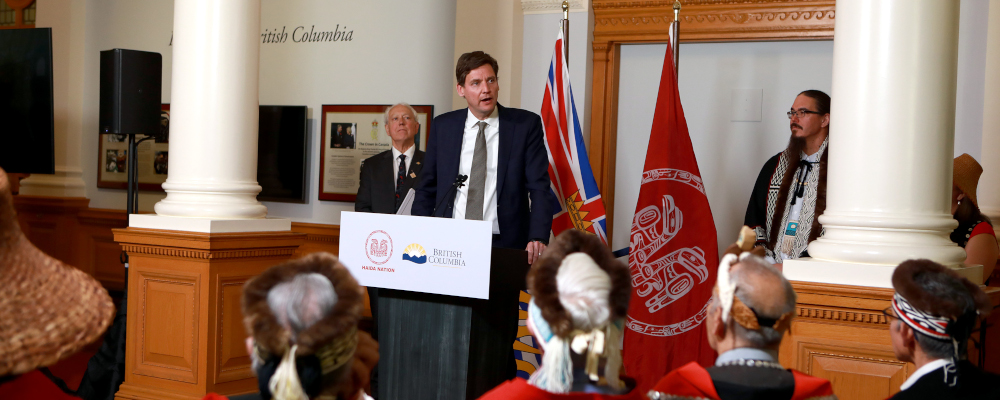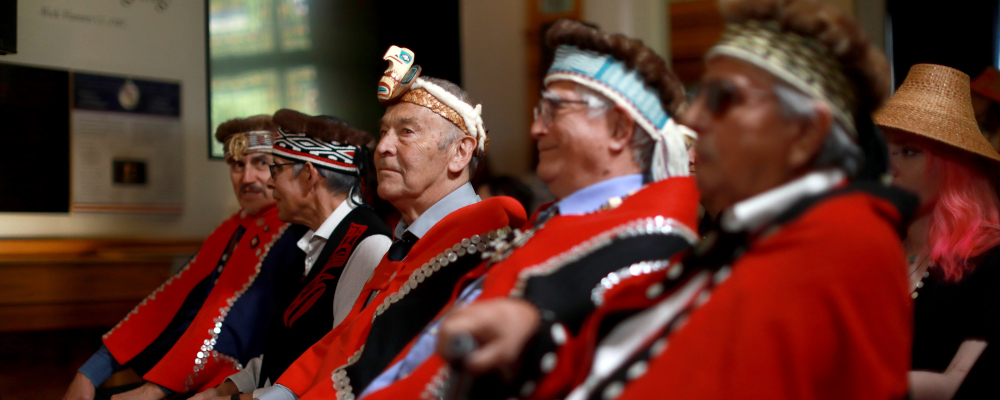Recently, a public outcry forced B.C.’s NDP government to pause amendments to the Land Act that would have allowed the province to give individual First Nations control over up to 95 percent of B.C.’s public lands, despite the absence of a democratic relationship between those Nations and more than 95 percent of the population.
Now, they are headed down an equally troubling path as they advance legislation to implement an agreement recognizing Haida title over the entirety of a group of islands known as Haida Gwaii. Concerns have been raised about the agreement’s potential impacts on private property, and about the constraints it places on future governments’ ability to act in the public interest.
Despite Haida Gwaii’s remote location and relatively small population of about 5,000 people, this agreement has huge implications. The premier himself has said he intends to use it as a “template” for other areas of B.C.

As law firm McMillan explains, Aboriginal title confers ownership rights similar to those associated with fee simple. These include the right to decide how the land will be used and who can occupy it, the right to possess the land, and the right to its economic benefits.
While the agreement contains assurances that private property will be honoured by the Haida Nation, McMillan identifies numerous outstanding questions as to how such claims can be reconciled with the Nation’s right as title-holders to choose how the land is used.
Another law firm, Cassels, echoes those concerns, writing that despite the government’s assurances, private property interests and the implementation of Aboriginal title are ultimately at odds: “the rights in land which flow from both a fee simple interest and Aboriginal title interest…include exclusive rights to use, occupy, and manage lands. The two interests are fundamentally irreconcilable over the same piece of land.”
Importantly, Aboriginal title is protected under the Constitution, while private property rights are not. When these irreconcilable interests are inevitably brought before the courts, it is easy to guess which will prevail.
There is also the matter of “other existing interests,” defined as interests with respect to land, water, air, or subsurface resources, including permits and tenures, as well as those held by the province in relation to public infrastructure such as highways, hospitals, and schools.
The agreement requires that decisions around such interests are to be made in accordance with Aboriginal title, something Cassels explains will likely require the consent of the Haida Nation. Critically, Cassels notes the province appears in this agreement to have given up its ability to justify proceeding with a decision in the public interest in the absence of such consent.
The Supreme Court of Canada has previously accepted such justification, something Cassels calls a “core governing tool” used to “balance Aboriginal and non-Aboriginal interests,” in recognition of the fact that “governments must legislate for societies as a whole.”
By giving up this tool, “the Province appears to have determined that, on Haida Gwaii, an Aboriginal interest takes priority over any consideration of competing non-Aboriginal or broader societal interests.”

As I’ve written previously, policies like this raise important concerns from a democratic perspective. While consulting with Indigenous groups on land use is consistent with democratic principles, and is already required by the courts, entering into agreements that effectively give Indigenous groups the power to govern over the broader public is not. This is because democracy demands that those affected by collective decisions have the right to participate in making those decisions, directly or through elected representatives.
In this case, the Haida constitution (like most Indigenous constitutions) does not allow non-Haida residents to vote in their elections. This is understandable when a Nation’s jurisdiction affects only its own citizens. However, when the province places its own broader decision-making powers into the hands of Indigenous governing bodies, there is a real problem because non-Indigenous British Columbians will be affected by—and even subject to—rules made by a government they have no role in electing.
Indeed, the Haida Agreement itself was approved in a referendum held for Haida Nation voters, but there was no such referendum for non-Haida residents who make up half the population of Haida Gwaii.
To be clear, Indigenous groups themselves are not responsible for the issues identified here. Their task is to look out for the interests of their own communities, and they are doing just that. It is the provincial government that is responsible for representing the interests of British Columbians as a whole, and this agreement threatens its ability to do so.
With the premier’s eagerness to replicate the agreement across B.C., and with 95 percent of the province’s land claimed as unceded territory by one or more of B.C.’s 200-plus Indigenous groups, the impacts are potentially massive for private property, the economy, democracy, and the public interest generally.
And yet, the B.C. government is rushing the bill through the legislature in the last weeks of the sitting before an election. With such enormous stakes, they owe it to the public to hit the brakes on the legislation and give the people a say.
Recommended for You

‘The economics are dismal, but are the politics smart?’: The Roundtable on the big problems with Carney’s major projects lists

Why Premier Smith hasn’t fired shots at Carney—yet

Canada already tried economic nationalism—it made us poorer

Carney’s major projects office more about Ottawa funding businesses than cutting red tape for free market: industry expert




